IAF
IAF Seminar on Moderation: Facilitation and Program Design
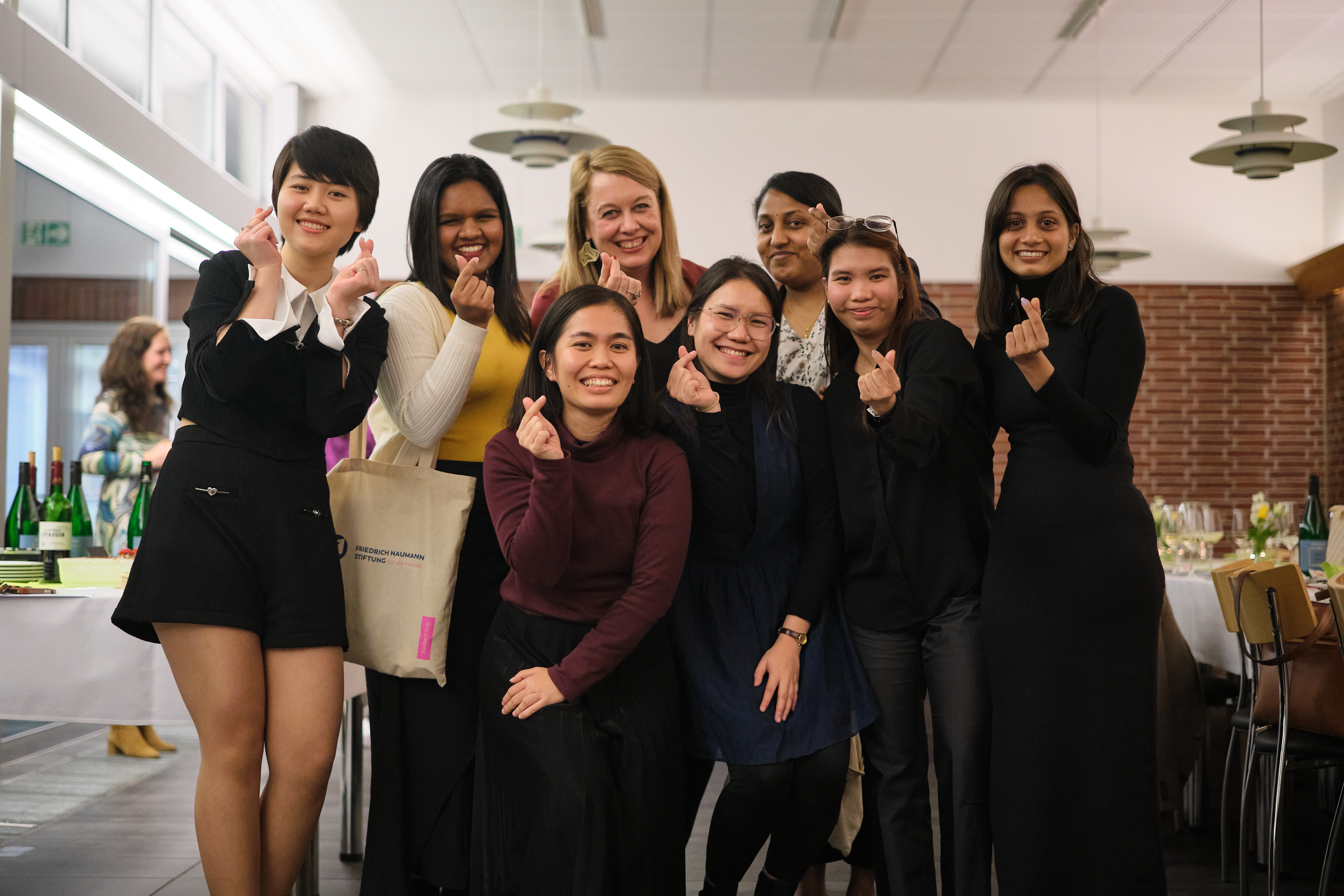
Kasturi (third person standing from the right) with friends she met in Gummersbach.
Despite our differences and diversity, gatherings are a common denominator that illuminates the essence of our humanity as social beings. Regardless of their form, gatherings are essentially an embodiment of a sacred space that strengthens bonds and forges new connections, fostering a sense of belonging and community. Given the right objectives and methods, gatherings possess transformative potential to incite change on various scales, from personal growth to societal transformation. However, orchestrating and guiding gatherings that resonate deeply and inspire transformation presents a considerable challenge.
The invitation to participate in the Seminar on Moderation: Facilitation and Program Design couldn't have come at a more opportune moment, coinciding perfectly with my contemplation on the intricacies of crafting events that possess profound significance and the potential to catalyse transformative experiences. In anticipation of the seminar, I meticulously reviewed and evaluated all the workshops and events I have previously organized, carefully selecting the themes that resonate with me the most.
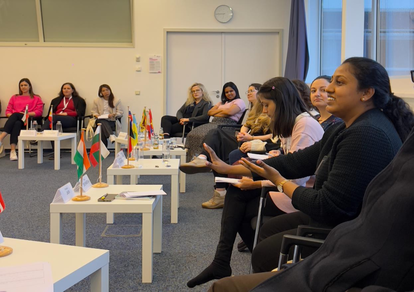
Kasturi, sitting on the far right of the picture, is explaining something to the forum.
Arrival
Despite arriving late and missing the welcome dinner, arriving at the International Academy for Leadership (IAF) at Gummersbach was a surreal moment. However, the actual “arriving” experience happened as Clinton and Marike guided us through the “arriving exercise” that allowed me to mentally and physically arrive at the seminar. Then we were given the leverage to create a “container” with the preferable values that would allow us to feel equal and participate with the utmost involvement throughout the seminar. The icebreaker activity designed to foster connections with other participants unfolded effortlessly as we were tasked with an assignment: to map out the various types of gatherings prevalent in our respective regions on a physical world map. At the conclusion of the "mapping assignment," it struck me that the true aim was not to produce a map but to facilitate interaction and engagement among participants.
Just as I thought we were still in the warming-up phase, we swiftly transitioned into high gear when presented with a facilitation challenge, propelling us into action sooner than expected. The assignment taught me how to negotiate ideas in a team, come up with creative ideas with limited resources, and present them clearly to the audience. The feedback provided by both the trainers and fellow participants at the end of the challenge was not only encouraging but also served to reaffirm the value and impact of our efforts. After that challenge, we were exposed to the facilitation in terms of way of being and way of doing. The exposure gave me a chance to examine my own awareness of myself, my preferences, and my habitual rituals, habits, and processes when it comes to facilitating events.
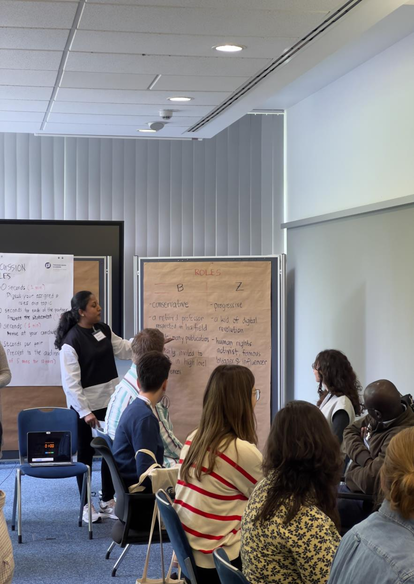
Kasturi is presenting something on the topic of Facilitation and Program Design.
Building the Foundation
We continued exploring facilitation in terms of way of being and way of doing as we learned about centers of facilitation. Under the guidance of the trainers, I delved into an examination of my inclinations and preferences concerning facilitation, focusing on facilitation centers such as people, content, outcomes, and process. At the end of the exercise, I realized that I have an inclination to give priority to the processes that my event participants go through while paying relatively less attention to content creation, people management, and the overall outcome of the event. We were also given the opportunity to explore eight typical styles of facilitation while identifying our personal inclinations and tendencies within this spectrum. I discovered that I have often assumed the roles of both organizer and provocateur within the context of my events and the advantages and disadvantages of remaining in the position. After that brief session, we departed for Köln in the bus prepared by the academy. The excursion was refreshing and allowed me to connect on a deeper level with the participants.
We returned to Gummersbach feeling refreshed and full of energy. Marike picked up the seminar by introducing us to the concept of a thinking environment. The concept of thinking environment itself was very new to me, but through a series of pair and group exercises, I learned to utilize the ten components of thinking environment in my conversations with others. The exercises felt incredibly therapeutic and calming, largely due to the sense of being genuinely heard and understood without any judgment by those around us. I also learned to attentively listen to people as well as appreciate and acknowledge their feelings. At the end of the day, I reflected on the significance of adopting the principles of a thinking environment to enhance our outcomes through fostering better relationships with those around us.
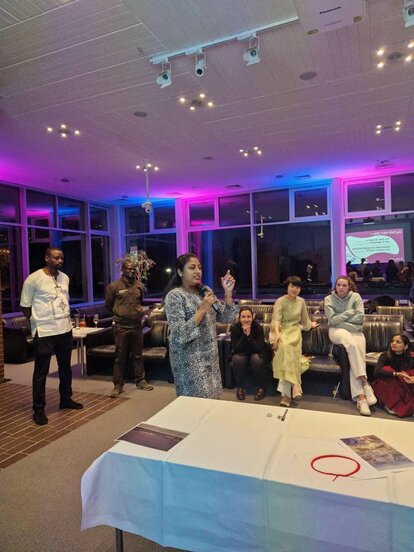
While attending the cultural night, Kasturi seems to be holding the attention of several of the people around her. She is in the middle of explaining something about her culture from back home.
To Berlin, We Go!
The next day, we seamlessly transitioned into an exploration of the four quadrants of gathering design conducted by Clinton which includes: 1) understanding gatherings; 2) designing gathering; 3) having the gathering; and 4) completing the circle. The session gave me a deep understanding of the different phases of organizing an event and its importance in producing successful gatherings. Following a brief exercise to discuss gathering design, we delved into a conversation about organizational culture, recognizing its pivotal role in either hindering or fostering efforts to design meaningful gatherings. The day drew to a close with a vibrant cultural night, where participants gathered to share and indulge in a rich tapestry of cultural cuisines and performances.
As the intensity of the seminar gradually heightened, we embarked on a transformative 3-day excursion to the dynamic city of Berlin. Our days in Berlin were very loosely planned, with only four experts sharing, giving us more time to explore the city. Observing Berlin's history, which served as a watershed for liberalism and was marked by pivotal events such as the fall of the Berlin Wall, filled me with a profound sense of awe and reverence for the resilience of the human spirit and the triumph of democracy over oppression.
While in Berlin, we met three experts to explore more about facilitation. The first visit was with Linus Stiedldorf from Masterplan, who guided us in event design aimed at achieving specific goals. I seized the opportunity to plan an event for a real project I had been working on, receiving valuable feedback on enhancing the planning process. In our subsequent session with Wiebke Koch, we explored visual facilitation techniques. I found this session particularly engaging, as we were encouraged to unleash our creativity and learn how to visually convey messages to participants. In the third session, Myruam Hadne led a discussion on establishing a safe space during events and the art of asking questions. The session was profoundly impactful, as we came to understand that cultivating a safe environment is integral to achieving desired outcomes in any gathering. On the final day of the excursion, we met Katie Gallus, who had years of experience facilitating and moderating events and was a was a powerful person. The insights shared by Katie provided me with a tangible understanding of the intricate process involved in organizing a gathering, spanning from venue selection to logistics management, grounding the theoretical knowledge in practical reality.
To Reflect and Triumph
Returning to Gummersbach, we carried with us vivid memories of Berlin and valuable connections forged with experts. During the remaining days at the academy, we furthered our exploration and were introduced to techniques and methods for connecting online at gatherings and events. We gained first-hand experience in exploring the tools and techniques available for online gatherings by actively participating in an online session organized by the trainers, allowing us to familiarize ourselves with these resources in a practical setting.
Following the brief online session, we were presented with a design challenge for a client hosting an upcoming seminar on liberalism, tasking us with generating innovative ideas to effect substantial change and enhancement to the event. As a team, we presented our meticulously crafted ideas to the client, integrating the knowledge and insights gleaned throughout the seminar. Subsequently, our proposal resonated with the client's vision, leading us to emerge victorious in the challenge. The final day of the seminar was filled with profound moments of self-reflection, heartfelt gratitude, and sincere appreciation for both fellow participants and the individuals who supported us throughout our journey.
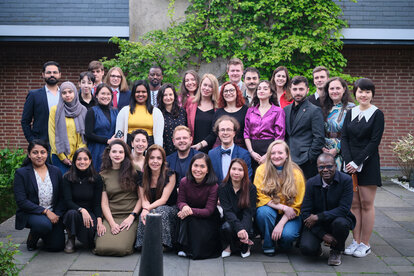
Group photo after dinner party in Gummersbach. One day before the participants' return date to their respective countries.
Looking back, the seminar stands out as a meticulously planned and expertly executed gathering, orchestrated by two exceptionally talented trainers. The seminar provided me with a valuable opportunity to reflect on and evaluate my own methods and preferences for organizing gatherings. Through this process, I was able to identify both the advantages and disadvantages of my current approach and subsequently develop strategies to address any shortcomings.
I appreciated the personalized approach of the seminar, which prioritized the development of facilitators themselves rather than solely focusing on content or participants. The trainers excelled at ensuring that every participant in the seminar had an equal opportunity to contribute and felt a sense of belonging. I am deeply grateful to FNF Malaysia and IAF for providing me with the invaluable opportunity to participate in the seminar, where I gained valuable experiences, learning, and connections that have greatly enriched my journey.
A Liberal Journey: Reflecting on the IAF Seminar "Liberalism vs Populism: How Can Liberals Win?"
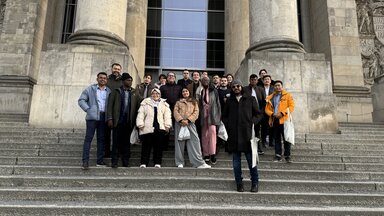
The current political landscape has witnessed the rise of populism in an almost simultaneous manner around the globe. In light of such phenomenon, the IAF aims to deconstruct populism in a comprehensive manner and reconstruct the liberal narrative as a counter approach. Discover how one of our alumni navigate a series of stimulating sessions on the dynamics between liberalism and populism as well as the political strategy and communications behind them.
Defending The Open Society
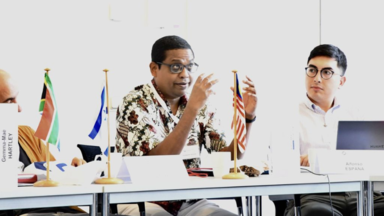
Embark on a captivating journey through the heart of the Open Society Seminar. A diverse group of 24 participants from 20+ nations converged in Gummersbach, Germany. Explore the fight for an open society amid rising extremism, with insights from distinguished guest speakers. Witness the resilience of renewal at the Dresden Church and the chilling truth at the Stasi Archive. Experience the overwhelming impact of Buchenwald. Join the camaraderie that unites defenders of liberal values. An unforgettable quest to rejuvenate the liberal soul awaits.
Liberalism and Geopolitics: How to Deal With a Changing World Order
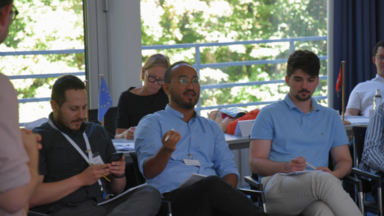
In a rapidly shifting global landscape, the traditional ideals of liberalism face unprecedented challenges. The rise of China's Belt and Road Initiative and Russia's recent incursions have left the liberal international community grappling with how to preserve democratic principles. Against this backdrop, a group of 25 global experts gathered at the International Academy for Leadership to explore the nexus of Liberalism and Geopolitics.
